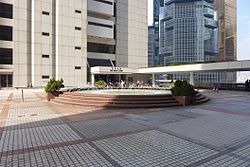Court of Appeal (Hong Kong)
Coordinates: 22°16′41.38″N 114°9′47.23″E / 22.2781611°N 114.1631194°E
| Court of Appeal | |
|---|---|
 Entrance of the High Court | |
| Established | 1 July 1997 |
| Location | 38 Queensway, Admiralty, Hong Kong |
| Authorized by | Hong Kong Basic Law |
| Appeals to | Court of Final Appeal |
| Website | http://www.judiciary.gov.hk/en/index/index.htm |
| President of the Court of Appeal | |
| Currently | The Honourable Mr Justice Jeremy Poon Shiu-chor, CJHC |
| Court of Appeal | |||||||||||||
|---|---|---|---|---|---|---|---|---|---|---|---|---|---|
| Traditional Chinese | 上訴法庭 | ||||||||||||
| Simplified Chinese | 上诉法院 | ||||||||||||
| |||||||||||||
The Court of Appeal of the High Court of Hong Kong is the second most senior court in the Hong Kong legal system. It deals with appeals on all civil and criminal cases from the Court of First Instance and the District Court. It is one of two courts that makes up the High Court of Hong Kong (which was formerly known as the Supreme Court of Hong Kong). Sometimes criminal appeals from Magistrates' Courts with general public importance are also dealt with in the Court of Appeal, either by referral by a single judge from the Court of First Instance, or upon granting of leave on application for review by the Secretary for Justice.
This court also hears appeals from the Lands Tribunal and various tribunals and statutory bodies.
The Chief Judge of the High Court of Hong Kong serves as the President of the Court of Appeal.
Prior to the establishment of the Court of Appeal in 1976, a Full Court consisting of first instance High Court judges was constituted to hear appeals.[1]
Cases in the Court of Appeal are decided by a bench consisting of one, two or three Judges. On rare occasions, having regard to the public importance of the issue, the Court of Appeal has been constituted by a division of five Judges.[2][3] Final substantive appeal hearings take place before a bench of three Judges. In civil cases, interlocutory appeals and leave to appeal application hearings take place before a bench of two Judges.[4] A single Judge can grant leave to appeal on a paper application and make procedural orders/directions not involving the determination of an appeal.[5] In criminal cases, appeals against sentence take place before a bench of two Judges[6] and leave to appeal application hearings take place before a single Judge.[7] A decision by a two-member bench of the Court of Appeal has the same binding precedential value as a decision by a three-member bench of the Court of Appeal[8][9] or a five-member bench of the Court of Appeal.[10] If a case is heard by a two-member bench and the two Judges differ on the outcome, then the lower court's judgment or order will not be disturbed.[11] In such a situation, any party can apply for the case to be re-heard by an uneven number of Judges in the Court of Appeal.[12][13]
A Judge of the Court of First Instance may also sit as a Judge in the Court of Appeal,[14] including as a single Judge (for example, when determining applications for leave to appeal in criminal cases).[15]
See also[]
- Vice Presidents of the Court of Appeal of Hong Kong
- High Court of Hong Kong
- Judiciary of Hong Kong
- Appellate court
References[]
- ^ A Solicitor v The Law Society of Hong Kong, FACV 24/2007, reported at (2008) 11 HKCFAR 117, at para. 21
- ^ A Solicitor v The Law Society of Hong Kong, FACV 24/2007, reported at (2008) 11 HKCFAR 117, at para. 21
- ^ See, for example, Chan Pui-ki v Leung On, CACV 263/1995, reported at [1996] 2 HKLRD 401, which was heard by the Vice President of the Court of Appeal (Mr Justice Litton) and four Justices of Appeal (Mr Justice Bokhary, Mr Justice Mortimer, Mr Justice Godfrey and Mr Justice Ching)
- ^ High Court Ordinance (Cap. 4), Section 34B(4)
- ^ High Court Ordinance (Cap. 4), Section 35(1)
- ^ High Court Ordinance (Cap. 4), Section 34(2A)
- ^ High Court Ordinance (Cap. 4), Section 34A
- ^ A Solicitor v The Law Society of Hong Kong, FACV 24/2007, reported at (2008) 11 HKCFAR 117, at para. 57
- ^ Chiu Hoi Po v Commissioner of Police, CACV 200/2006, reported at [2008] 4 HKLRD 67, at para. 45
- ^ A Solicitor v The Law Society of Hong Kong, FACV 24/2007, reported at (2008) 11 HKCFAR 117, at para. 58
- ^ High Court Ordinance (Cap. 4), Section 34(5)-(6)
- ^ High Court Ordinance (Cap. 4), Section 34B(5)
- ^ See, for example, Eugene Jae-Hoon Oh v Kate Gaskell Richdale, CACV 162/2003, reported at [2005] 2 HKLRD 285, in which Ma CJHC and Cheung JA disagreed on the outcome. The case was subsequently re-heard before Woo VP, Le Pichon JA and Chung J in Eugene Jae-Hoon Oh v Kate Gaskell Richdale, CACV 162/2003.
- ^ High Court Ordinance (Cap. 4), Section 5(2)
- ^ Criminal Procedure Ordinance (Cap. 221), Section 83Y
External links[]
- Appellate courts
- Court of Appeal (Hong Kong)
- 1997 establishments in Hong Kong
- Courts and tribunals established in 1997
- Hong Kong stubs

